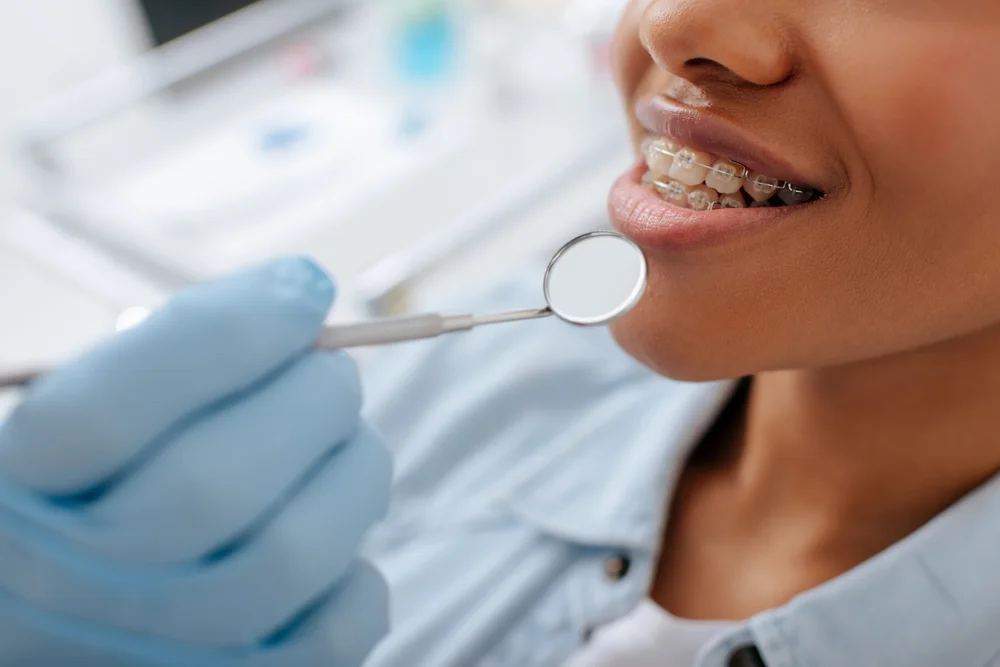
What is dental anxiety?
If you experience anxiety before dental treatments, you are not alone. Dental anxiety affects an estimated 36% of people in the United States, and 12% of people feel extreme fear. In some cases, anxiety may lead to phobia, and both can have severe implications for a person’s oral and overall health. When patients delay or avoid dental care due to fears about dentistry, the likelihood of dental disease and other serious oral health problems increases.
At Hutta & Price Orthodontics, your well-being is our priority, which is why we don’t only want you to love your smile– we also want you to love the process of achieving it. While many people rely on some form of sedation to calm their nerves about the orthodontist, we wanted to share additional strategies for addressing your fears and improving your comfort with dentistry and orthodontics.

Understanding the source of your fear
Understanding the root cause of your nervousness can help you and your dentist or orthodontist address the issue. Being fearful of pain in dentistry settings is quite common, but for some patients, past experiences play an even larger role. Negative experiences with dentists or doctors in the past can prompt lasting fears. If you experienced pain during a procedure as a child or if you had complications from surgery—even if it wasn’t at the dentist’s office—you may have negative associations with dental procedures.
Another common concern is that forms of sedation will not work. For others, fears may stem from the potential side effects of sedation, like dizziness or nausea. In addition to worries about sedation, some patients feel an uncomfortable loss of control or invasion of personal space. A history of head or neck injuries can also lead to fear since this area of your body may feel particularly sensitive. Dentistry tools like needles and drills can also trigger fears, in addition to settings associated with dentistry.
The relationship between orthodontist and dentist anxiety
Dentistry and orthodontics are closely related. For most patients, sitting in a dentist’s chair and an orthodontist’s chair feel very similar. If you’re nervous about a routine teeth cleaning procedure with your dentist, visiting the orthodontist for other dental services to improve your smile may also lead to stress.
Who can be affected?

Dental fears can affect patients of all ages. People who also struggle with generalized anxiety disorder, PTSD, depression, bipolar disorder, schizophrenia, OCD, and other fear-based disorders, like agoraphobia and claustrophobia, may be more likely to experience dentist anxiety.
Supporting a child to overcome their orthodontic fears
For children, being scared of the orthodontist often stems from the unknown. Children don’t know what to expect at their appointment, and this can make them wary of orthodontic services. Talking to kids about what to expect can go a long way in calming their nerves about an appointment and can help them become more comfortable with dentistry in general.
At Hutta & Price, we are experts in orthodontic care for kids and are committed to ensuring that our youngest patients are comfortable and content during each step of their treatment. Learn more here.
How fears about dentists impact oral health
While the emotional and psychological impact of dental fear and phobia should not be understated, dental anxiety can have other, equally serious consequences. Delaying or missing an important appointment or regularly avoiding dental and orthodontic services altogether is detrimental to oral health. Not only do teeth need regular cleaning, but missing appointment after appointment also means that dentists won’t be able to catch little issues before they become big oral health concerns. Your dentist and orthodontist also regularly screen for more serious conditions and diseases, which can be more easily treated in their early stages. Ignoring what feels like a minor tooth ache or pain now may lead to surgery or a more complicated procedure in the future.
Signs and symptoms
Signs of dental anxiety include sweating, racing heartbeat, low blood pressure or fainting, crying, and forms of withdrawal like using humor or aggression to mask anxious feelings.
More serious signs of dental phobia include an inability to sleep before a procedure or feeling physically ill at even the thought of dentistry or orthodontic care.
Tips to calm your nerves before your visit
Stress management is always a good idea, but for patients who feel uneasy about dentists and orthodontists, it is even more important. If you experience fear when it’s time to visit the dentist or orthodontist for treatment or a procedure, there are ways to prepare that will help you calm your nerves and prevent your anxiety from spiraling into panic. Being proactive about your appointment—and not just relying on sedation during the appointment—will help you set yourself up for a positive visit.
Deep breathing and meditation
Full deep breaths help to calm your nervous system. Practicing a deep breathing technique or meditation before and during appointments can be a natural form of sedation.
Plan ahead
Schedule appointments for days when you won’t be too busy and can prioritize your own rest and care.
Watch your diet before your appointment
Avoid anything high in sugar or caffeine before appointments. Not only can these interfere with your sleep the night before, but they may put you on edge when you get to the office.
Practice guided imagery
Developing supportive imagery for your appointments can be a great way to care for yourself before and during appointments. Giving yourself something to think of that’s completely unrelated to teeth and dentistry can soothe your nerves.
Don’t delay routine dentist visits
Avoiding routine office visits can make a worry about a tooth spiral out of control and can contribute to a sense of unease at appointments. Committing to regular care of your teeth can help the whole process feel routine and familiar.
Communication is key
Talk to your orthodontist about your fears. Ask them to walk you through your procedure before it happens and explain what they’re doing while it’s underway. You could also agree on a hand signal that you can use if you need a break during procedures.
Consider additional support
There’s nothing wrong with needing a little more help. You might require medical sedation, like an oral medication, or you may ask your doctor about twilight sedation or general anesthesia for certain procedures. Bringing along a weighted blanket or preparing a soothing playlist to listen to during appointments are also excellent options for nervous patients.
Advancements in dentistry
It’s perfectly normal to be wary of someone poking around your teeth. The good news is that advancements in dentistry have made orthodontic care more comfortable, efficient, and effective than ever before. At Hutta & Price, our doctors can now move each tooth precisely and with minimal pressure, delivering your best smile quickly and without pain.
At Hutta & Price, we’re not only committed to results you’ll smile about for a lifetime to come—we care about your experience each step of the way. From the moment you step inside our office to the moment you leave with your best smile, we’ll make sure you feel right at home.
Reach out today to learn more about the world-class service, technology, and doctors that set us apart.